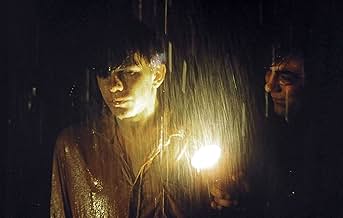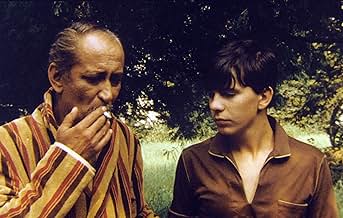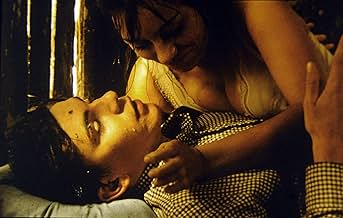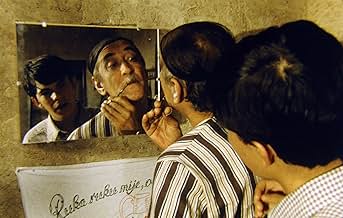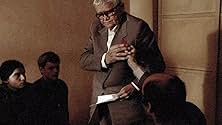VALUTAZIONE IMDb
7,5/10
7109
LA TUA VALUTAZIONE
Un giovane cresce a Sarajevo negli anni '60 e viene attratto dal mondo dei criminali. Lo assumono per nascondere una giovane prostituta e si innamora di lei.Un giovane cresce a Sarajevo negli anni '60 e viene attratto dal mondo dei criminali. Lo assumono per nascondere una giovane prostituta e si innamora di lei.Un giovane cresce a Sarajevo negli anni '60 e viene attratto dal mondo dei criminali. Lo assumono per nascondere una giovane prostituta e si innamora di lei.
- Regia
- Sceneggiatura
- Star
- Premi
- 7 vittorie e 1 candidatura in totale
Pavle Vuisic
- Tetak
- (as Pavle Vujisic)
Zivko 'Zika' Ristic
- Cica
- (as Zika Ristic)
Recensioni in evidenza
I've seen this piece very shortly after I've seen Underground(which is my personal no.1). I was prepared for another energy daredevil movie trip into metaphor and symbolism - I was surprised and pleased ... Kusturica has shown ability to produce two absolutely different movies - both superb!
Do you remember Dolly Bell? is funny, sad, romantic, mystic ... and it is real, it is not a movie to go for if you are not in a mood to think and think a lot ... it is a movie about communism and its philosophy as understood by each generation - I've lived those times and I accept: this is not the typical life we lived, but it defines the essence of how we felt and what we did...
Do you remember Dolly Bell? is funny, sad, romantic, mystic ... and it is real, it is not a movie to go for if you are not in a mood to think and think a lot ... it is a movie about communism and its philosophy as understood by each generation - I've lived those times and I accept: this is not the typical life we lived, but it defines the essence of how we felt and what we did...
Kusturica is something of a challenge for me to parse. The experience is a bit troubling because it seems so genuine that we should be ashamed for intruding. He does not seem to accomplish this by ordinary means. Yes, the acting is good, but what works here is something quite a bit deeper than usual.
Instead of the world of the film coming to us, as is usually the case, he inserts the camera in such a way that we – or rather our intent to see – brings it into being. This is an early film, and already he seems to have mastered the art of composition. This has a couple of his trademarked panning sequences that are the most elaborately choreographed I know. But more than that, each scene progresses through what seems to be an ordered diorama of gypsy projection. It is intensely human. I can imagine the filmmaker crying as he blocks the shot and places the actors, lights, camera.
I can imagine him obsessing over how objects and shadows form families that work the way the central family does here. I can see his passion in how he guides the camera in arcs that are unnatural. It is a wonder he continued to make films, such is the obvious cost.
A lost nation. A lost larger family. A lost love. Do we remember? Can you?
Because I encounter young filmmakers, and see their first works, I know it is possible to spring whole into the art, allowing open completion of soul to make up for insufficient craft. As time went on, Emir learned to layer humor and circumstance, to tell a story. But nothing he will do can match this, his first love.
Ted's Evaluation -- 3 of 3: Worth watching.
Instead of the world of the film coming to us, as is usually the case, he inserts the camera in such a way that we – or rather our intent to see – brings it into being. This is an early film, and already he seems to have mastered the art of composition. This has a couple of his trademarked panning sequences that are the most elaborately choreographed I know. But more than that, each scene progresses through what seems to be an ordered diorama of gypsy projection. It is intensely human. I can imagine the filmmaker crying as he blocks the shot and places the actors, lights, camera.
I can imagine him obsessing over how objects and shadows form families that work the way the central family does here. I can see his passion in how he guides the camera in arcs that are unnatural. It is a wonder he continued to make films, such is the obvious cost.
A lost nation. A lost larger family. A lost love. Do we remember? Can you?
Because I encounter young filmmakers, and see their first works, I know it is possible to spring whole into the art, allowing open completion of soul to make up for insufficient craft. As time went on, Emir learned to layer humor and circumstance, to tell a story. But nothing he will do can match this, his first love.
Ted's Evaluation -- 3 of 3: Worth watching.
whichever corner of the balkans is called home, it is all but unuarguable that Kusturica is the region's greatest filmmaker. i have enjoyed all of his films - most especially "Otac na sluzbenom putu" and "Underground" - but none disturbed me quite like this one disturbed me.
the reason is that he portrays a (former) Yugoslavia i do not know, and have never known. both my parents fled the "acceptable face of communism" during the very years this film shows almost nostalgically. they were roughly the same age as the main character, yet their experience of Tito's paradise was completely and utterly apposite to what Kusturica shows on the screen. the world they knew was one of deprivation and disappearances and harassment and they could not get away from it fast enough.
i am not saying either viewpoint is right or wrong. i just find it eye-openingly disturbing that the same place at the same time can be remembered in such radically different ways.
i believe there is a lesson in that for all of us, especially those of us whose roots lie in the balkans.
the reason is that he portrays a (former) Yugoslavia i do not know, and have never known. both my parents fled the "acceptable face of communism" during the very years this film shows almost nostalgically. they were roughly the same age as the main character, yet their experience of Tito's paradise was completely and utterly apposite to what Kusturica shows on the screen. the world they knew was one of deprivation and disappearances and harassment and they could not get away from it fast enough.
i am not saying either viewpoint is right or wrong. i just find it eye-openingly disturbing that the same place at the same time can be remembered in such radically different ways.
i believe there is a lesson in that for all of us, especially those of us whose roots lie in the balkans.
Emir Kusturica's first film Do You Remember Dolly Bell? is a bittersweet comedy set in the former Yugoslavia during the 1960s. The film, which won the Golden Lion Prize at the 1981 Venice Film Festival, is both a coming of age story and a tribute to the city of Sarajevo, long before it was devastated by civil war. To the chagrin of his strict Communist father (Slobodan Aligrudic), sixteen-year old Dino (Slavo Stimac) is more into hypnosis and self-help mantras than Marxist ideology. He recites the phrase "Every day in every way I'm getting better and better" and sings in a new band mandated by the local Eastern European bureaucracy as they relax the Communist grip and allow some influence of Western culture.
Dino's family of six live in a cramped one-room house while they wait for state housing. The father drinks excessively and the family is poor. This is underscored when, during a visit to relatives, the youngest boy makes a point of saying how much he wishes he had a bicycle like the one he sees in the relative's home. Through Dino's relationship with Sonny, an unsavory pimp, he meets a cabaret singer and prostitute Dolly Bell (Ljiljana Blagojevic), named after a stripper in an Italian film they had seen recently at the Culture Club. Dolly is forced by Sonny to wait in the attic of Dino's home until he returns and Dino is a passive onlooker as a band of delinquent boys take their turn with her.
Dino's sweet innocence captivates the young girl, however, and the two form a bond that results in Dino's sexual initiation and first love affair. Dino has to cope with his father's illness, a lung cancer that has become life-threatening and their days together reveal a much mellower man who tells Dino he knew about the girl in the loft and no longer disapproves his using hypnosis and auto-suggestion. While Dolly Bell lacks the polish and cinematic flair of Kusturica's later work, it is an honest and intelligent film, one that avoids sentimentality and provides compelling insight into what it meant to grow up in Eastern Europe during the sixties.
Dino's family of six live in a cramped one-room house while they wait for state housing. The father drinks excessively and the family is poor. This is underscored when, during a visit to relatives, the youngest boy makes a point of saying how much he wishes he had a bicycle like the one he sees in the relative's home. Through Dino's relationship with Sonny, an unsavory pimp, he meets a cabaret singer and prostitute Dolly Bell (Ljiljana Blagojevic), named after a stripper in an Italian film they had seen recently at the Culture Club. Dolly is forced by Sonny to wait in the attic of Dino's home until he returns and Dino is a passive onlooker as a band of delinquent boys take their turn with her.
Dino's sweet innocence captivates the young girl, however, and the two form a bond that results in Dino's sexual initiation and first love affair. Dino has to cope with his father's illness, a lung cancer that has become life-threatening and their days together reveal a much mellower man who tells Dino he knew about the girl in the loft and no longer disapproves his using hypnosis and auto-suggestion. While Dolly Bell lacks the polish and cinematic flair of Kusturica's later work, it is an honest and intelligent film, one that avoids sentimentality and provides compelling insight into what it meant to grow up in Eastern Europe during the sixties.
Seeing "Dolly Bell" during the recent war in Kosovo forced me to think of the political significance of the film. Almost twenty years after the film was made, Yugoslavia is an extraordinarily different place, albeit one in which traditions die hard. But whether considered in relation to the Yugoslavia of the early 80s or to today's Serbia, what impresses about "Dolly Bell" is its filmmakers' devotion to art and the human condition rather than to a political agenda. It has not become an artifact because it was made to provoke human sympathy, not political reaction. "Dolly Bell" is not a tragicomic masterpiece like "Underground" nor a celebration of optimism and levity in the face of absurdity and injustice as are "When Father Was Away on Business" and "Time of the Gypsies": it is not Kusturica's most clever film, but it is perhaps his most enduring.
Lo sapevi?
- QuizWinner Best Actor (Slavko Stimac) at 25th Panama International Film Festival.
- ConnessioniFeatured in Maradona di Kusturica (2008)
- Colonne sonore24 mila baci
Written by Adriano Celentano, Lucio Fulci, Piero Vivarelli
Performed by Adriano Celentano
[Sung along to by Slavko Stimac]
I più visti
Accedi per valutare e creare un elenco di titoli salvati per ottenere consigli personalizzati
- How long is Do You Remember Dolly Bell??Powered by Alexa
Dettagli
Contribuisci a questa pagina
Suggerisci una modifica o aggiungi i contenuti mancanti

Divario superiore
By what name was Ti ricordi di Dolly Bell? (1981) officially released in India in English?
Rispondi

